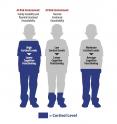Stress in low-income families can affect children's learning
Children living in low-income households who endure family instability and emotionally distant caregivers are at risk of having impaired cognitive abilities according to new research from the University of Rochester. The study of 201 low-income mother-child pairs, conducted at Mount Hope Family Center, tracked the levels of the stress hormone, cortisol, in the children at ages 2, 3, and 4. It found that specific forms of family adversity are linked to both elevated and low levels of cortisol in children. Children with either the elevated or low cortisol levels also had lower than average cognitive ability at age 4.
"What we were interested in seeing is whether specific risk factors of children living in poverty might be related to children's cortisol levels," said lead author Jennifer Suor, a PhD candidate in clinical psychology. "Then we looked to see if the hormone levels are predictive of significant differences in the children's ability to think."
The study, published in the journal Child Development, shows that children in low-income, stressful home environments--specifically homes with family instability and harsh and disengaged mothers--can have adverse levels of cortisol in their bodies, which previously studies have associated with having damaging affects on the structure and function of children's brains.
Understanding how cortisol affects the brain's cognitive abilities, though, is still unclear. "The exact mechanisms through which too much or too little cortisol affects cognitive functioning aren't fully understood," said coauthor Melissa L. Sturge-Apple, assistant professor of psychology.
illustration of three people showing low and high cortisol level related to low cognitive function and moderate cortisol levels related to average cognitive function "Researchers hypothesize that too much cortisol can have toxic effects on parts of the brain that are important for cognitive functioning, and too little might hinder the body's ability to recruit the biological resources necessary for optimal cognitive functioning," Sturge-Apple said.
"Moderate amounts of cortisol is a good thing, though, it helps facilitate cognitive functioning," added Suor. "In the right amount it makes you rise to the occasion and it helps recruit important cognitive resources like memory and the ability to reason. But it's a problem when we have too much or too little cortisol."
The children with family instability or harsh and emotionally distant caregivers at age 2, had elevated cortisol levels, while children with only family instability at age 2, had lower than average cortisol levels. "We were surprised to find that the children's cortisol levels, which we test from a cheek swab, didn't change--they remained relatively stable over the three years," Suor said.
Family instability includes frequent changes in care providers, household members, or residence. Such instability, the researchers said, reflects a general breakdown of the family's ability to provide a predictable and stable environment for the child.
Suor added that "there are other environmental and biological factors that might contribute to children's lower cognitive functioning. However, our research, as well as previous studies, has indicated that cortisol plays a role in cognitive functioning."
"There is a public awareness relevance to this study. We saw really significant disparities in the children's cognitive abilities at age four--right before they enter kindergarten," Suor said. "Some of these kids are already behind before they start kindergarten, and there is research that shows that they're unlikely to catch up."
The researchers said that prevention and intervention could help these at-risk children. "Our findings support the need for an investment in community-based interventions that can strengthen parent-child relationships and reduce family stress very early in a child's life," Suor said.
"A lot of research that we've done at Mt. Hope shows that using preventative interventions can help moms parent their children in ways that may lead to improvements in their children's cortisol."
Source: University of Rochester
Other sources
- Stress in low-income families can affect children's learningfrom Science DailyFri, 19 Jun 2015, 15:40:09 UTC
- Stress in low-income families can affect children’s learningfrom Science BlogFri, 19 Jun 2015, 13:30:17 UTC
- Life stress negatively affects poor children's cognitive developmentfrom UPIWed, 17 Jun 2015, 18:50:14 UTC
- Early life stress affects cognitive functioning in low-income childrenfrom Science DailyWed, 17 Jun 2015, 16:30:51 UTC
